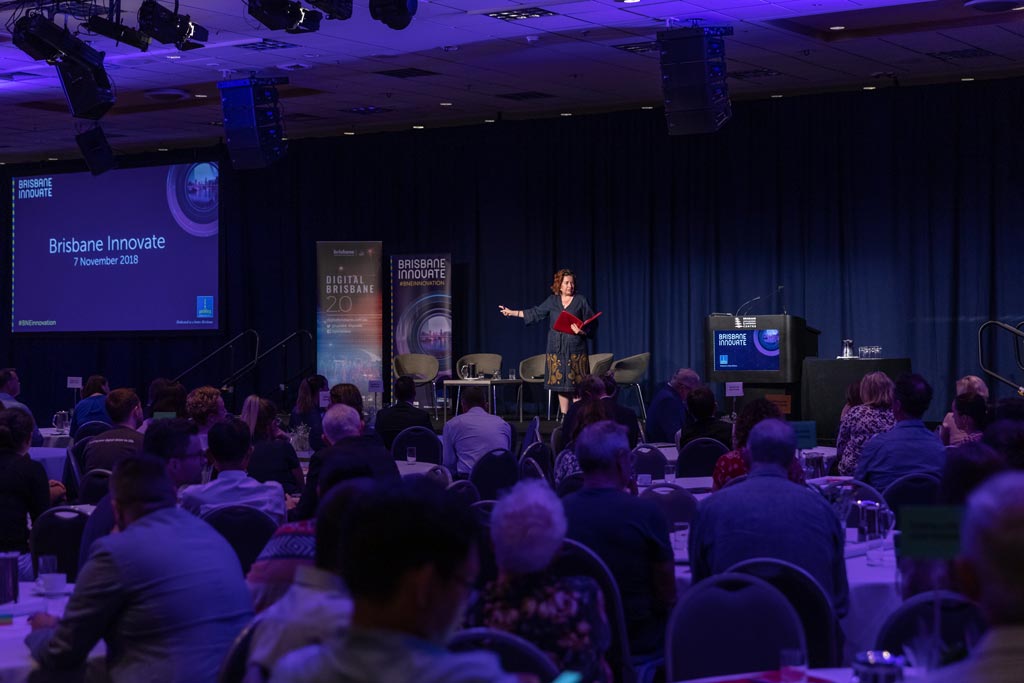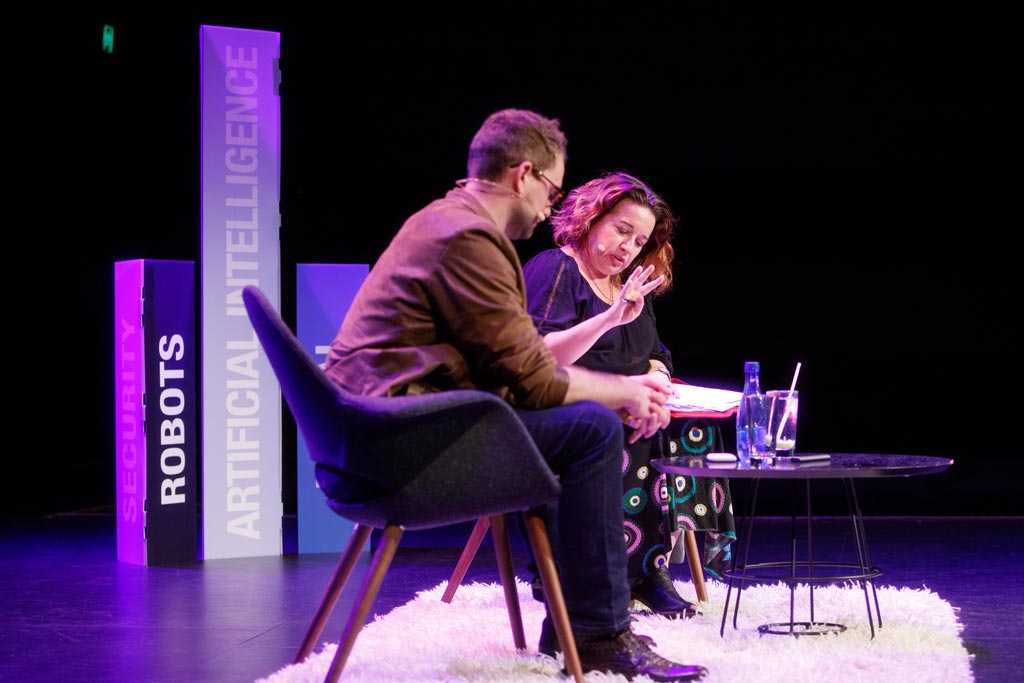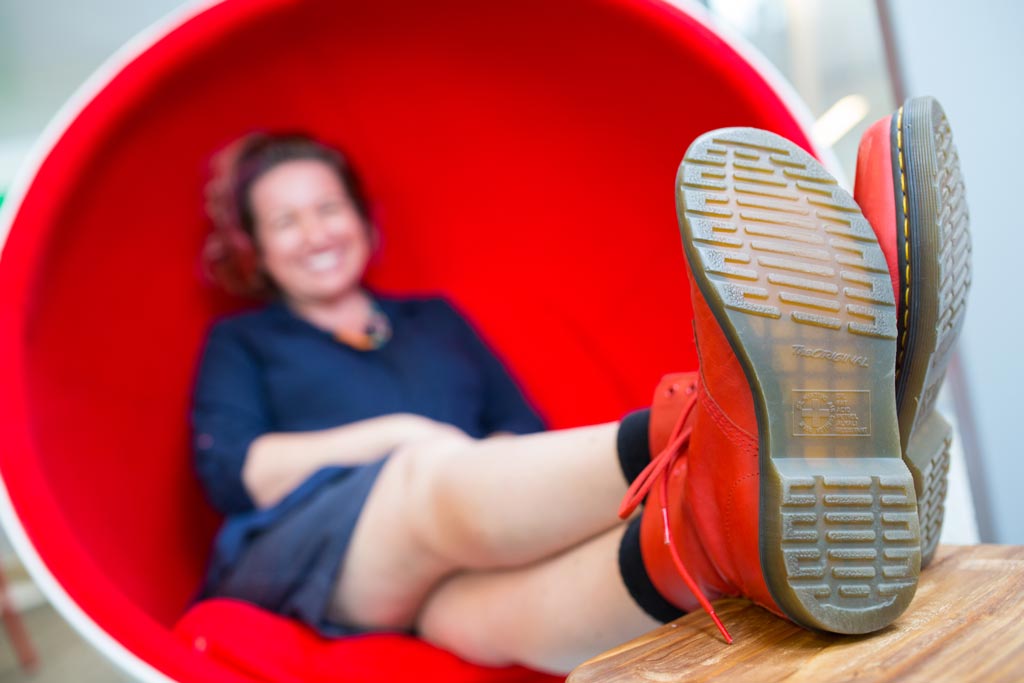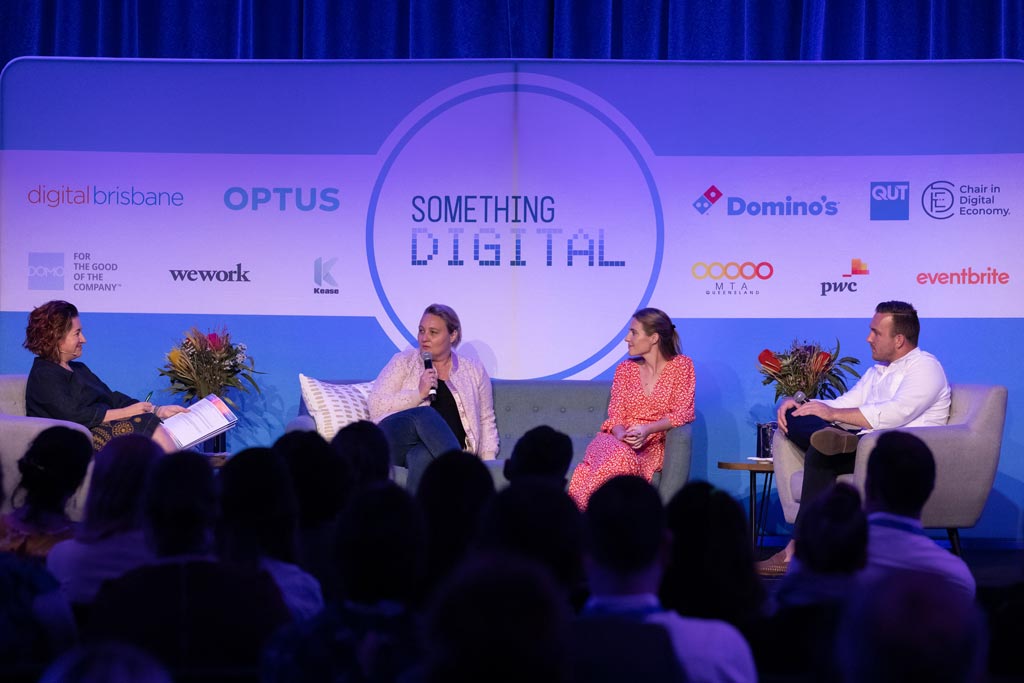Cat Matson On Inclusive, Collaborative Entrepreneurship & How To Combat Innovation Theatre
Cat Matson is Brisbane’s Chief Digital Officer and the General Manager of Innovation for the city’s economic development board, Brisbane Marketing.
As Chief Digital Officer she is charged with the digital transformation of the city and driving Brisbane’s city-wide digital strategy. Cat is a passionate advocate for human-centric ‘smart cities’, recognising that digital is an enabler, not an outcome in its own right.
Appointed in 2014, Cat was recently recognised as one of Australia’s top digital innovators, winning the Digital Experience Leader for Australia in the 2018 IDC Digital Transformation Awards.
Cat discusses key insights as Brisbane’s Chief Digital (or analogue?) Officer, describing where entrepreneurialism has got stuck in the past, providing clear ways forward and offering ideas to solve real problems effectively.
Highlights from the interview (listen to the podcast for full details)
[Tom Allen] - Could you please share a bit about your background and what led you to helping local communities build more diverse, resilient and inclusive economies?
[Cat Matson] - I wish I could say that it was that deliberate. My background has always been in the personal empowerment space. In fact, many years ago, when I did a personal development program called the Landmark Forum, I articulated my personal vision as creating spaces and places in which to empower people in their lives. At that stage, I was a business coach. I don't know that I ever set out to create vibrant and creative economies.
However, when the opportunity came up to join Brisbane Marketing as the city's Chief Digital Officer, it turns out that that was exactly the opportunity that I was stepping into. So I often pinch myself. I feel like I have the best gig in the world.
Absolutely. So, as the General Manager of Innovation and Brisbane's Chief Digital Officer, tell us a little bit more about this role, and the sort of projects that you're involved in.
All right. So, some history. The role was created in 2012.
We were the second city in the world to appoint a Chief Digital Officer.
Wow.
That was after New York City. I wasn't the city's first Chief Digital Officer. We had somebody else in the role at that time, but I came on in 2014, to execute the strategy that had been put in place. Now, the reason Brisbane appointed a Chief Digital Officer was the recognition that, at that time, all these things digital were coming down the line, and we didn't know they were going to impact us.
We have to remember, back in 2012, Uber hadn't hit Brisbane yet. Airbnb hadn't hit Brisbane yet. Goodness knows, we were not even thinking about flying cars, or the impact of Uber on the gig economy, the taxi industry, all that kind of stuff.
But more importantly, we also didn't understand the impact of digital disruption on small business, and that is key for Brisbane.
So that was the original remit of the CDO, to support small businesses to build their capability, to cope with the changes. In 2017, we reinvigorated the strategy, the Digital Brisbane strategy, and in that document, we articulated the renewed vision, to build our local economy, by creating new and innovative jobs, whilst making Brisbane the easiest city in the world, in which to work, grow, learn, contribute and live together.
So, through that, my role has been everything from supporting startups, creating and leading the initiatives that we call The Capital, which is the city's startup and innovation hub, that sits in the heart of the Queen Street Mall. It's producing programs like the Lord Mayor's Global Entrepreneur Program, which provides $5,000 grants to businesses that have the potential to scale, and grow exports and jobs, and also, probably my proudest and most fun project, which is Brisbane Innovate, the city's open innovation platform there.
Tell us more about that.
Oh, if I have to! Brisbane Innovate was born out of the recognition that innovation is actually best done openly, not closed, and the poor analogy that I used to describe that distinction is, even in companies like Apple, which is cited as the most innovative companies in the world (well, they used to be), they do things in closed silos. The design team don't know what the engineering team are working on, and likewise, the software team. That's done to reduce leaks, make sure nobody can copy, and whatnot.
But unfortunately, what that means is that you only get iterative innovation. You don't get the big game-changing, "Oh, my God, what if it was this?", instead of an iPhone.
Open innovation is more collaborative.
You actually assume that multiple people, multiple stakeholders, they might not be the content experts, but they will have an input to make. They will have ideas to make.
If you can find a way to legitimately collaborate, then you can innovate for more powerful solutions, more cost effective solutions, solutions that more people buy into, and solutions that actually, the end user, in my case, residents, actually want.
So Brisbane Innovate, for the last three years, we're in our fourth year now, has consisted of a one-day summit, held first at City Hall, and then at the Brisbane Convention and Exhibition Centre, because we grew out of City Hall, yay!
It also has what we call the Always On Lab. So, the Brisbane Innovate Lab, where we take the conversations that are started at the summit, and actually nurture them in a quasi-accelerator model, quasi-concierge model, quasi, just, "Okay, what we do to get this idea off the ground?"
We use a lot of design thinking principles. We use my knowledge of how Council works, State Government works, industry works, we connect dots.
Some days I just feel like a circus ringmaster, just kind of literally pulling everybody in the right direction, to bring the ideas to life.
As an enabler!
An enabler, that's exactly right. I am an enabler of many, many, many things, some good, some others.
You've done a lot of work with startups, with small business, with the broader residents of the city, so what makes Brisbane unique, then, as an ideal place to start and grow a purpose-led business?
Well, I'm going to start with the things that makes Brisbane ideal to start and grow any business. And then, the purpose-led, I actually think, stems out of it. So, for me, Brisbane's small, compared to other cities in Australia, and small, population-wise. But we have one Council that covers the majority of the metropolitan area, which means that there is a greater degree of coordination.
We have a delightful lifestyle, and whilst lifestyle's not necessarily a prerequisite to business, it's certainly a prerequisite to creativity.
It's certainly a prerequisite to popping new ideas, because you've actually got... you know, you can pop off work at four o'clock, and have a beer somewhere in the sunshine, and go, "Oh, that's an interesting idea."
I think our biggest advantage is what I call our two degrees of separation.
It's not our six. That notion that you can find whoever you want, whenever you need them, within just a couple of quick calls. That personable nature of Brisbane, I think is where the purpose-led innovation really comes into the fore, or the purpose-led business.
People in Brisbane genuinely like their lifestyle, and they genuinely care about each other.
I often joke that I shouldn't be called the Chief Digital Officer; I should be called the Chief Analogue Officer. And that's because, at the end of the day, people are people, and the elements of life that we value the most are the ones that have us connect to people.
I think Brisbane is a spectacular place to start and run and grow a purpose-led business, because it's in our DNA.
We don't have the dog-eat-dog competitive nature that some other cities have. We've got the space, we've got the opportunities, and, I guess, through programs like Brisbane Innovate, through what you do with Impact Boom, there are opportunities to actually build a thriving and profitable purpose-led business, rather than it just being seen as a, "Oh, yeah, once I've got my stability in order, then I can do that."
Absolutely. That's great to hear. So, I'm keen to hear about a few more opportunities. I mean, Brisbane Innovate creates opportunities, and it brings people together. But where do you see further opportunities, to help residents and businesses thrive, then in this globally connected and digitally enabled world?
I think it's a really interesting one, because those opportunities largely depend on where people want the opportunity. So, for example, at the school aged basis, we're seeing more and more initiatives to get young people involved in thinking differently. And not necessarily because the ways of the past are redundant, but because the ways of the future are really interesting and a bit different, and uber-connected.
So we have people like Nicole Dyson and her business Future Anything. We have Scott Miller and BOP, doing all of his school-based programs. We have the work that River City Labs do with their school holiday programs, genuine opportunities for young people to be involved. And not only young people, of course…
as soon as you get school-aged kids involved, then their parents have to get involved too, right?
Yep!
So we've got some opportunities there. I think other opportunities sit in some of our priority industry sectors.
For a long time, entrepreneurialism got stuck in, "Because we can, we will." Now we're actually saying, "Well, actually, what really needs to be done?"
So there's some burning platform questions around the importance of ethical artificial intelligence, and artificial intelligence that augments human capacity, rather than takes over.
There's some interesting work going on in what we call the property tech sector. And I don't just mean breathing buildings, but anything and everything that can be done to minimise impact, whilst building structures that will serve as populations grow, particularly in urban environments.
Other opportunities to help? I think there's what I call the small nudges that we do. So, the Lord Mayor's Global Entrepreneur Program is a really good example of that nudge, where $5,000 is a drop in the ocean to what's really needed, to grow a business.
But the Lord Mayor's Global Entrepreneur Program helps us uncover businesses that have the potential to grow, if, one, they knew that they were actually, had that opportunity to grow, and two, if they just had the right guidance.
So whilst it's only a $5,000 grant, and to be honest, that's the honey that we use to attract in the first place. But then, once they're in that cohort of successful recipients, they get guidance, they get mentoring, they get concierging, they get introductions to all sorts of different people, who then help them on their way.
Unlock opportunities.
And unlock opportunities, that's exactly right. But what are the other opportunities? There's so many. There's so many, we could be here all day.
We could! And we could be talking about innovation all day. But innovation, I think, is becoming an overused buzzword, especially in the last five years or so.
So, how might cities and startup hubs move beyond innovation theatre and actually deliver tangible outcomes that see ideas executed, and deliver impact?
She steps onto her soapbox.
Look out.
Innovation theatre is one of my pet peeves in this industry. Innovation, first of all, is not new. The human species has been innovating since time began. It's called survival.
Yep.
And it's called, our innate desire to do things more effectively and more efficiently than we did them yesterday. So yes, in fact, I struggle even with my title of General Manager of Innovation, because it's like, so, General Manager of ‘?’...
How do we move past innovation theatre? I think there's a few ways. First of all, we call it out when we see it.
We stop attending the events where that's all it's about, when somebody pitches an idea like Tinder for dogs, was one of my stock standard examples. "Really? You've got Tinder for dogs? That's amazing! Tell me the problem that that's solving."
We have those honest conversations. But I think that, then, it also comes back to reminding people that you start a business, or you design an innovation strategy, to do it better than you did before, or to solve a genuine problem.
So, for me, it's asking multiple whys. ‘Why, why, why, and for whom does this solve a real problem?’
The other thing that I do, is when people tell me the person that is going to benefit, I go, "Are they currently paying for their problem?" Because if they're not, chances are, you haven't landed on the right stakeholder or the right customer group.
So it's actually one of the key areas that I see in social enterprise, and I myself, am guilty of this. I'm a do-gooder. I want to save the world.
But at the end of the day, I want to save the world. And so, every problem that I see in the world, I go, "Right! Well, how do we fix that?" And it's really easy to say, "Well, we should do this."
But until you can figure out the, "We should do this," in the context of a supply or a value chain, you're just talking jazz hands.
So it's always got to come back to the why, it's always got to come back to the who.
I also think another way of removing the innovation theatre is to make our language more inclusive. I still, five years into the role, struggle with terms like entrepreneur. Because entrepreneur seems to have taken on a very unique, narrow niche of people, who are building globally scalable businesses. But the plumber or the baker who is setting up a local-based business, he's just as entrepreneurial. In fact, I would sometimes argue, more so, because they're actually risking more. But they don't feel included in the entrepreneurial conversation, because we invite people in for razzle dazzle events.
So, I just think we have to be mindful of how our language excludes, rather than includes.
Yeah, that's a golden point, hit the nail on the head.
So, inspiring projects, do you have any inspiring projects? You've been speaking a little bit about this entrepreneurial term, so are you aware of any entrepreneurs creating great positive social impact, environmental social change, or do you want to go off on a tangent here?
Did you just read my mind? For me, there are buckets of inspiring projects and if you want to see or hear about inspiring projects, you just go through the back catalogue of this particular podcast. And you've got hours of inspiration.
What I actually find inspiring, are the people who just genuinely want to give it a go, who want to flog what other people would see as a dead horse.
One of the things that has really landed for us, in the last three months or so, is the true power of Brisbane Innovate.
So, as I mentioned at the top, four years on, Brisbane Innovate... we've had 1,200-odd people attend the summit events, have got all fired up, hot and bothered to solve big civic challenges. And we're addressing big civic challenges, social isolation and exclusion, pedestrian-friendly cities, circular economy challenges. But then, of course, they go back into their real lives.
And so, the projects that might flow out of that aren't necessarily as life changing as some would want them to be. But what I find inspiring is what comes out of that, and that's what I'm now calling the genuine civic leaders, who just need… (and for the listeners, I've got my hands kind of making a... I'm always putting my hands around these people. It's not like a hug, but they just need to be guided.)
Because they genuinely have the idea, they have the wherewithal, they have the interest, and sometimes, they even have the time to do it.
They just need to be pointed in the right direction of who do you talk to, how do you navigate the political process? How do you navigate the supply chain? How do you navigate the people with vested interests? Without seeing them all as evil enemies, which I think is another thing that gets in the way, when we're trying to do this big change.
So what we've landed on in the last few months is actually, Brisbane Innovate is just as much about supporting the grass roots civic leaders, and demonstrating to them that they are the civic leaders.
One of the insights that we gained out of our last workshop was, they, the attendees, are all looking for somebody to lead them. What they don't realise is that they are actually the leaders.
So, inspiring projects, buckets, inspiring people, so many of them, and I'm now kind of reshaping my role, and how do I enable and empower them to go and do their stuff? Rather than strangling them.
What an exciting role to have…
As I said, best gig in the world.
So to finish off, I'm keen to hear about a couple books that you might recommend to our audience…
Alrighty. Well, my all-time, flat out, best book that I would recommend is Seven Habits of Highly Effective People by Stephen Covey. And in fact, it must have been the anniversary of his death just the other day, because a Facebook memory popped up, a beautiful photo of him, that said, "Habit Number Nine, leave the world in a better place than it was when you found it. Mission accomplished." So, yes, Seven Habits of Highly Effective People.
An excellent book.
And probably the lesser known book of his, that many listeners wouldn't have even picked up on, is The Eighth Habit, which is about genuine leadership. It's a stunning, stunning book, and a humbling book, as Covey of course was.
They're my two books. I mean, in terms of other resources, quality sources of information on the Internet. And I'd say that very deliberately.
Find your trusted sources and then unsubscribe from everything else. Because the overwhelm of information, particularly the overwhelm of BS information takes us down rabbit holes that take us all off track, and waste more time, than add value.
What a brilliant point to end on, Cat. Thanks so much for sharing your valuable insights and time today. It'll be great to watch Brisbane Innovate, and all your other projects and initiatives take the city forward to tackle some of our biggest social and environmental issues.
Initiatives, resources and people mentioned on the podcast
Brisbane Innovate (2019 program soon to be announced).
Recommended books
Seven Habits of Highly Effective People by Stephen Covey
The Eighth Habit by Stephen Covey










